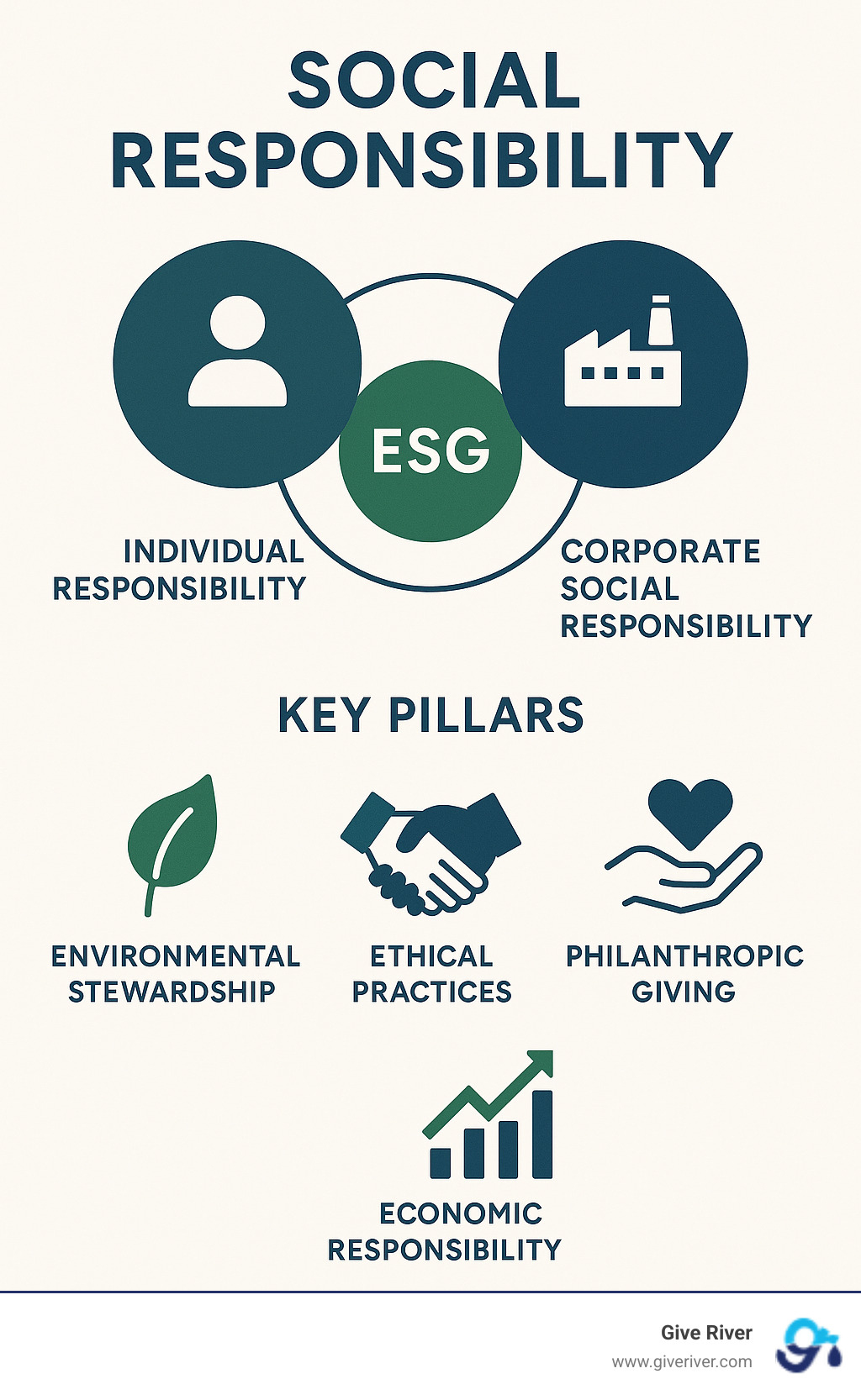The ABCs of SR: Your Guide to Social Responsibility's Core Concepts
Discover the social responsibility meaning and definition. Learn its core pillars, business benefits, and how to integrate SR for impact.

Why Social Responsibility Is More Than Just a Buzzword
Understanding social responsibility meaning and definition is crucial for business leaders as employees and consumers demand purpose-driven organizations. Social responsibility is an ethical framework where individuals and organizations act to benefit society while considering their impact on people, communities, and the environment.
Quick Definition:
- Social Responsibility: The obligation to act in ways that benefit society as a whole
- Key Components: Environmental stewardship, ethical labor practices, community engagement, and transparent governance
- Core Principle: Balancing profit with positive societal and environmental impact
- Scope: Applies to both individuals and organizations
The numbers tell a compelling story: 77% of consumers are motivated to support companies they see as improving the world, while 70% of people wouldn't work for a company without a strong purpose. Even more striking, 60% are willing to take lower pay to work at companies with meaningful missions.
This isn't just about doing good—it's about building sustainable organizations. An MIT meta-analysis of 200 surveys revealed high global interest in Corporate Social Responsibility (CSR), showing it has evolved from a nice-to-have to a business imperative.
The modern workplace demands more than traditional employee recognition programs. While platforms like Bonusly and Kudos focus primarily on peer-to-peer recognition, forward-thinking organizations are finding that true employee fulfillment comes from connecting work to meaningful societal impact.
As Meghan Calhoun, I've learned from two decades in high-pressure roles that understanding social responsibility is essential for building cultures where employees contribute to something bigger than themselves.

Unpacking the Social Responsibility Meaning and Definition
Digging into social responsibility meaning and definition reveals a simple truth: our choices have a ripple effect. For any business, it asks the fundamental question: How can we create positive change while we pursue our goals?
What Is the Core Definition of Social Responsibility?
Think of social responsibility as an ethical compass guiding actions that benefit society as a whole. It's not about following rules, but proactively choosing to make a difference because we're all interconnected.
The concept has ancient roots. Philosophers like Aristotle and Marcus Aurelius understood that individual success and collective welfare are linked—a truth we're refinding today. As Aurelius put it: "That which isn't good for the hive isn't good for the bee."
Modern social responsibility builds on this wisdom, emphasizing accountability for your impact on people, communities, and the environment. It means looking beyond immediate profits to consider the broader consequences of your decisions.
The ISO 26000 standard on social responsibility defines it as "the responsibility of an organization for the impacts of its decisions and activities on society and the environment, through transparent and ethical behavior." This definition highlights transparency, ethical conduct, and sustainable development as keys to lasting positive change.
Understanding What is the Purpose of Corporate Social Responsibility helps illuminate why this framework matters so much in today's business world.
The Four Pillars of Corporate Social Responsibility
For businesses, four key pillars provide a roadmap for meaningful action. These are practical areas where companies can make a real difference and build stronger, more sustainable organizations.
Environmental Responsibility focuses on protecting our planet. This includes investing in renewable energy, implementing recycling programs, and reducing carbon footprints, recognizing that healthy businesses need a healthy planet.
Ethical Responsibility centers on treating people with fairness and dignity. This means ensuring fair wages, safe working conditions, honest supplier relationships, and quality products. Companies embracing this pillar actively work to eliminate exploitative practices in their supply chains.
Philanthropic Responsibility involves giving back through donations and volunteer programs, such as supporting local nonprofits or sponsoring community events. Effective Community Impact Initiatives strengthen both communities and company culture.
Economic Responsibility demonstrates that profit and purpose can coexist. It involves financial decisions that benefit society, like creating jobs and investing in communities. It proves the "triple bottom line" (people, planet, profit) is a practical business strategy.
Together, these pillars create a comprehensive framework for genuine, lasting impact.
Social Responsibility in Action: Individuals vs. Organizations
The beauty of social responsibility meaning and definition is its universal application—it works at every level, from personal choices to corporate decisions.
As individuals, social responsibility appears in daily choices: supporting ethical businesses, volunteering, or engaging in respectful dialogue. It also means considering how our decisions affect future generations.
Research from Nature suggests humans are wired for cooperation, meaning social responsibility aligns with our best instincts.
For organizations, social responsibility becomes Corporate Social Responsibility (CSR). Companies like Patagonia have built their brand around environmental stewardship, while TOMS Shoes created a business model around their "one-for-one" giving promise. These companies prove that social impact can be woven into business success.
The conversation has expanded to include Environmental, Social, and Governance (ESG) criteria, which investors use to evaluate companies. Sustainability has become a key goal, with social responsibility serving as the pathway to achieve it.
At Give River, we've found that social responsibility thrives when integrated into daily work. While platforms like Bonusly and Kudos focus on peer recognition, Give River uniquely integrates charitable impact and gamification to foster a culture of generosity. We connect individual actions to community impact, showing employees their work creates positive change.
You can explore more What is Corporate Social Responsibility? and find inspiring CSR Examples that show these principles in action.
The Business Case: Benefits and Criticisms of Social Responsibility
The growing emphasis on social responsibility meaning and definition isn't purely altruistic. Smart leaders recognize that doing good and doing well often go hand in hand, and the impact is still meaningful.

The benefits are compelling. Improved brand reputation strengthens customer relationships (77% of consumers support such companies). Employee satisfaction and retention soar when work feels meaningful (70% of workers need a strong purpose). Socially responsible companies also attract top talent, as values and impact can be deciding factors. This leads to increased customer loyalty and sales from consumers who connect with brands sharing their values.
Crucially, it contributes to long-term sustainability and risk mitigation. Proactively addressing environmental and social issues builds resilience and adaptability.
However, social responsibility faces legitimate criticisms. Milton Friedman argued corporations should only maximize profits. Others worry about "greenwashing"—misleading claims about social or environmental practices. Critics also argue it distracts from core business functions and that a lack of standardized measures makes assessing true impact difficult.
The key is authentic integration that strengthens the business. For more insights, explore the Advantages of Corporate Social Responsibility.
Successful companies weave social responsibility into their culture, making it inseparable from their success.
Putting Social Responsibility into Practice: A Strategic Approach
Understanding the social responsibility meaning and definition is the first step; putting it into practice requires a strategic approach that integrates ethics into every facet of the business.
Many organizations struggle to move from good intentions to meaningful action. The key is a systematic approach that makes purpose as fundamental to your business as profit.
How to Effectively Integrate Social Responsibility into Your Business
Integrating social responsibility effectively means embedding these principles into your company's DNA. It's about creating a culture where doing good isn't just a nice-to-have—it's how you do business.

The first step is setting clear goals and values that define what social responsibility means for your organization. This isn't about copying others, but identifying issues relevant to your industry, stakeholders, and community. Your goals should be specific, measurable, and authentically connected to your business.
Where many companies go wrong is treating social responsibility as a separate initiative. Integrating into core operations means weaving these principles into your business model. This could mean redesigning processes to reduce environmental impact, changing supply chain management to ensure ethical labor, or incorporating community engagement into marketing.
Stakeholder engagement is where the magic happens. Your employees, customers, suppliers, and community should be active participants. Involving employees in charitable giving or volunteer programs builds a sense of shared purpose that transforms how people feel about their work.
The importance of measuring and reporting impact cannot be overstated. Without clear metrics and transparent reporting, efforts can feel empty or appear as greenwashing. This means collecting real data and honestly sharing your progress—including shortcomings. What is Corporate Social Responsibility Reporting offers valuable insights into making this process effective.
Perhaps most crucially, you need to foster a culture of ethics and purpose. This goes beyond posting values on a wall—it means promoting diversity, equity, and inclusion, providing ethical training, and recognizing employees who embody these values.
Crucially, voluntary adoption is more effective than compliance-driven approaches. Proactive companies gain competitive advantages and build stronger stakeholder relationships.
For practical inspiration, explore CSR Initiatives Examples and What are Three Ways Businesses Demonstrate Corporate Social Responsibility to see how other organizations are making this work.
The Future of Social Responsibility and Your Role in It: A Final Look at the Social Responsibility Meaning and Definition
The evolution of social responsibility meaning and definition is remarkable, moving from ancient philosophy to today's comprehensive frameworks like ISO 26000 and ESG criteria.
Millennials and Gen Z are reshaping the landscape as both employees and consumers. These generations don't just prefer socially responsible companies—they demand them. They are willing to take lower pay for meaningful work and research a company's values before buying. This is the new reality of business.
The future is one of shared responsibility, driven by the collective efforts of individuals, communities, and governments to support and incentivize responsible behavior.
This all points toward the ultimate goal: sustainability—the balance between economic development, environmental protection, and social equity. Social responsibility is the pathway to ensuring our progress today doesn't compromise the well-being of future generations.
At Give River, we've seen how powerful it is when organizations accept this vision. Our unique 5G Method integrates recognition, guidance, wellness, growth, gamification, and community impact to make social responsibility a living part of their culture. While platforms like Bonusly and Kudos excel at peer-to-peer recognition, Give River stands out by making charitable impact a core part of the employee journey, turning individual actions into collective good deeds.
We believe something profound happens when employees feel connected to a larger purpose and can actively create community impact. It's not about meeting expectations or checking boxes, but building workplaces where fulfillment and productivity flourish together.
The question isn't whether social responsibility will grow in importance—it's whether your organization will lead this change or struggle to catch up. We invite you to be part of shaping this future. Learn how to build a culture of charitable impact and find how Give River can help you create a workplace where social responsibility is a living part of your everyday success.



